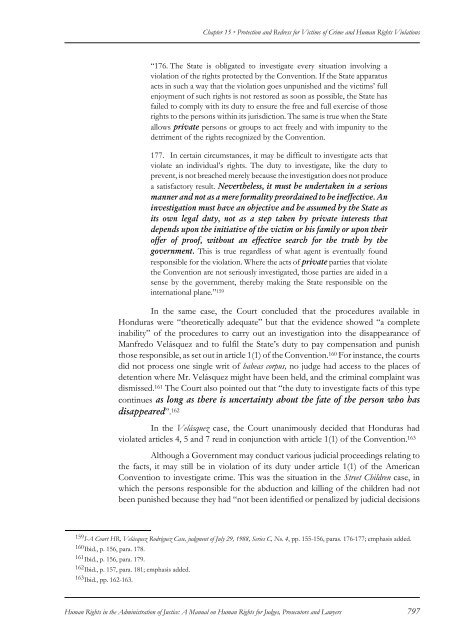protection and redress for victims of crime and human rights violations
protection and redress for victims of crime and human rights violations
protection and redress for victims of crime and human rights violations
You also want an ePaper? Increase the reach of your titles
YUMPU automatically turns print PDFs into web optimized ePapers that Google loves.
Chapter 15 • Protection <strong>and</strong> Redress <strong>for</strong> Victims <strong>of</strong> Crime <strong>and</strong> Human Rights Violations“176. The State is obligated to investigate every situation involving aviolation <strong>of</strong> the <strong>rights</strong> protected by the Convention. If the State apparatusacts in such a way that the violation goes unpunished <strong>and</strong> the <strong>victims</strong>’ fullenjoyment <strong>of</strong> such <strong>rights</strong> is not restored as soon as possible, the State hasfailed to comply with its duty to ensure the free <strong>and</strong> full exercise <strong>of</strong> those<strong>rights</strong> to the persons within its jurisdiction. The same is true when the Stateallows private persons or groups to act freely <strong>and</strong> with impunity to thedetriment <strong>of</strong> the <strong>rights</strong> recognized by the Convention.177. In certain circumstances, it may be difficult to investigate acts thatviolate an individual’s <strong>rights</strong>. The duty to investigate, like the duty toprevent, is not breached merely because the investigation does not producea satisfactory result. Nevertheless, it must be undertaken in a seriousmanner <strong>and</strong> not as a mere <strong>for</strong>mality preordained to be ineffective. Aninvestigation must have an objective <strong>and</strong> be assumed by the State asits own legal duty, not as a step taken by private interests thatdepends upon the initiative <strong>of</strong> the victim or his family or upon their<strong>of</strong>fer <strong>of</strong> pro<strong>of</strong>, without an effective search <strong>for</strong> the truth by thegovernment. This is true regardless <strong>of</strong> what agent is eventually foundresponsible <strong>for</strong> the violation. Where the acts <strong>of</strong> private parties that violatethe Convention are not seriously investigated, those parties are aided in asense by the government, thereby making the State responsible on theinternational plane.” 159In the same case, the Court concluded that the procedures available inHonduras were “theoretically adequate” but that the evidence showed “a completeinability” <strong>of</strong> the procedures to carry out an investigation into the disappearance <strong>of</strong>Manfredo Velásquez <strong>and</strong> to fulfil the State’s duty to pay compensation <strong>and</strong> punishthose responsible, as set out in article 1(1) <strong>of</strong> the Convention. 160 For instance, the courtsdid not process one single writ <strong>of</strong> habeas corpus, no judge had access to the places <strong>of</strong>detention where Mr. Velásquez might have been held, <strong>and</strong> the criminal complaint wasdismissed. 161 The Court also pointed out that “the duty to investigate facts <strong>of</strong> this typecontinues as long as there is uncertainty about the fate <strong>of</strong> the person who hasdisappeared”. 162In the Velásquez case, the Court unanimously decided that Honduras hadviolated articles 4, 5 <strong>and</strong> 7 read in conjunction with article 1(1) <strong>of</strong> the Convention. 163Although a Government may conduct various judicial proceedings relating tothe facts, it may still be in violation <strong>of</strong> its duty under article 1(1) <strong>of</strong> the AmericanConvention to investigate <strong>crime</strong>. This was the situation in the Street Children case, inwhich the persons responsible <strong>for</strong> the abduction <strong>and</strong> killing <strong>of</strong> the children had notbeen punished because they had “not been identified or penalized by judicial decisions159 I-A Court HR, Velásquez Rodríguez Case, judgment <strong>of</strong> July 29, 1988, Series C, No. 4, pp. 155-156, paras. 176-177; emphasis added.160 Ibid., p. 156, para. 178.161 Ibid., p. 156, para. 179.162 Ibid., p. 157, para. 181; emphasis added.163 Ibid., pp. 162-163.Human Rights in the Administration <strong>of</strong> Justice: A Manual on Human Rights <strong>for</strong> Judges, Prosecutors <strong>and</strong> Lawyers 797
















